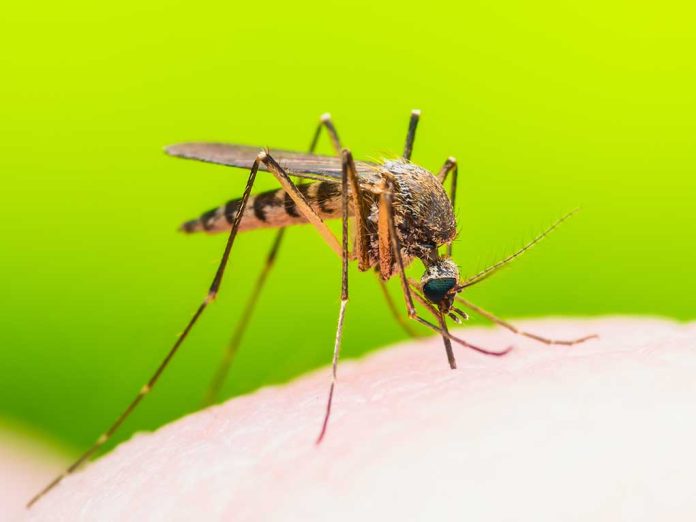
A rare but deadly mosquito-borne virus has Massachusetts towns on high alert, urging residents to take immediate precautions.
At a Glance
- Eastern equine encephalitis (EEE) virus detected in Massachusetts, leading to park closures and warnings
- First human case since 2020 reported in a man in his 80s
- State health officials recommend finishing outdoor activities by 6 p.m. until September 30
- No vaccines or treatments available for EEE, which has a 30% mortality rate
- Residents advised to use mosquito repellents and drain standing water around homes
EEE Virus Threatens Massachusetts Communities
The Eastern equine encephalitis (EEE) virus, a rare but potentially fatal mosquito-borne disease, has emerged as a significant threat in Massachusetts. Several towns have taken drastic measures, including closing parks and fields each evening, to protect residents from exposure. Plymouth, Douglas, Oxford, Sutton, and Webster are among the communities urging residents to exercise extreme caution, particularly during nighttime hours when mosquito activity is highest.
The first human case of EEE in Massachusetts since 2020 has been reported in a man in his 80s from Oxford. This case, along with the infection of a horse in Plymouth, has prompted state health officials to issue urgent warnings and implement preventive measures.
Health Officials Implement Preventive Measures
To combat the spread of EEE, the Massachusetts State Department of Public Health (DPH) has announced aerial and truck-mounted spraying for mosquitoes. The pesticide Anvil 10+10, approved by the Environmental Protection Agency, will be used in targeted areas. DPH Commissioner Robbie Goldstein emphasized the severity of the situation, stating, “We have not seen an outbreak of EEE for four years in Massachusetts. This year’s outbreak and activity raise the risk for communities in parts of the state. We need to use all our available tools to reduce risk and protect our communities. We are asking everyone to do their part.”
State health officials are advising residents to finish outdoor activities by 6 p.m. until September 30, and by 5 p.m. after that until the first hard frost. Additionally, residents are strongly encouraged to use EPA-registered mosquito repellents, wear long sleeves and pants when outdoors, and drain standing water around their homes to eliminate potential mosquito breeding sites.
The Deadly Nature of EEE
The Centers for Disease Control and Prevention (CDC) classifies EEE as a very serious disease with a 30% mortality rate among those infected. Symptoms include fever, headache, vomiting, diarrhea, and seizures. Even more concerning is that survivors often face permanent disabilities, with few making a full recovery.
The gravity of EEE cannot be overstated. There are currently no vaccines or treatments available for the virus, making prevention the only effective strategy. The last major outbreak in Massachusetts occurred in 2019-2020, resulting in 17 human cases and seven deaths. This history underscores the potential devastation EEE can cause and the importance of community vigilance.
Community Response and Vigilance
Local officials are emphasizing the critical role of community awareness and cooperation in managing this public health threat. Michelle Bratti, Plymouth’s Commissioner of Health and Human Services, stressed the importance of following guidelines: “As Mass DPH has now elevated Plymouth’s EEE risk status to high, it is important to take extra precautions when outdoors and follow state and local health guidelines to avoid unnecessary risk of exposure to EEE. The health and safety of our community, residents, and visitors remain our priority.”
The family of the infected man from Oxford is also working to raise awareness about the severity of EEE. They want to ensure that people understand the serious physical and emotional consequences of the disease, regardless of whether the infected person survives.
As Massachusetts faces this health crisis, the cooperation of every resident is crucial. By following the recommended precautions and staying informed, communities can work together to minimize the impact of EEE and protect vulnerable populations. The coming weeks will be critical in determining the course of this outbreak and the effectiveness of the state’s response.
Sources:
1. A rare but deadly mosquito virus infection has Massachusetts towns urging vigilance
2. A rare but deadly mosquito virus infection has Massachusetts towns urging vigilance
3. Deadly mosquito-borne virus sees Massachusetts towns shutting parks and fields
4.The Rare But Deadly Mosquito Virus Concerning U.S. Towns














